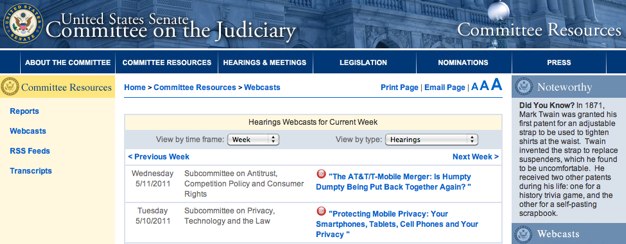Anhörung im US-Senat: Google und Apple äußern sich zur Sammlung von Ortsdaten
Am gestrigen Dienstag sprachen Apple und Google in einer Anhörung zum Thema ‚mobiler Datenschutz‘ vor. Die Stellungnahmen vor dem US-Senat führten Apples Vizepräsident für Software-Technologie Dr. Guy „Bud“ Tribble und Googles Lobbyist Alan Davidson.
Die mehrseitigen Niederschriften der geladenen Konzerne finden sich hier und hier. Eine Transkription vom Live-Ticker hält das ‚This-is-my-next…‘-Blog vor. Die 174 Video-Minuten lassen sich außerdem im US-Senats-Archiv unter „Protecting Mobile Privacy: Your Smartphones, Tablets, Cell Phones and Your Privacy“ einsehen.

Große Erkenntnisse blieben dabei weitgehend aus. Generell wurde mehr Transparenz und Nutzer-Aufklärung gefordert:
5:18 pm „I just want to be clear — the answer to this problem is not ending location-based services. No one wants to stop Apple or Google from doing what they do. You guys are brilliant. When people think of brilliance they think of the guys that founded your companies. Today is about finding a balance.“
Aus den Mitschriften, die auch Fragen der Senats-Mitglieder beinhalten, ist ersichtlich, dass viele unterschiedliche Dinge in einen gemeinsamen Topf geworfen werden.
Einerseits wird gefragt:
5:35 pm Franken: Do any companies in mobile have to meet data security standards? What’s to prevent them from being hacked?
5:36 pm Weinstein: I’m not aware of any legal requirement that any company that has your data needs to secure that data in any way.
Zwischenzeitlich wird dann gerne einmal plakativ festgestellt:
5:52 pm Senator Blumenthal: The internet is the wild west…
Andererseits aber immer wieder betont…
5:59 pm Weinstein: People are not as aware as they should be. These situations aren’t criminal, but they do highlight the need to be more transparent.
…um sich dann wieder den anwesenden Vertretern von Google und Apple zu widmen:
6:22 pm Brookman: The easiest way for a company to get in trouble is make concrete statements about what they’re doing, so they just remain vague
6:25 pm Tribble: During this collection process, the iPhone does not transmit personally identifiable data to Apple.
6:26 pm Tribble: Apple has built a master mobile location services switch into iOS. When the switch is off, all location services are off. What’s more, iOS apps can’t get location without popping up an authorization box, which can’t be switched off.
Die teils hitzige Diskussion warf auch zielführende Fragen auf:
6:40 pm Franken: Apple said it builds a crowd-sourced database of hotspots and cell tower to rapidly and accurately calculate its location, but the letter you sent me says the data isn’t your location. Are both of these true? Does this data indicate your location or doesn’t it?
6:41 pm Tribble: The data that’s in the database is the location of as many hotspots and cell towers as we can have. It’s completely anonymous. However, when a portion of that database is downloaded onto your phone, your phone knows what towers and hotspots it can receive right now. The combination is how the phone figures out where it is without GPS.
Googles praxisorientierte Antwort gilt sicherlich für beide Unternehmen:
6:29 pm Davidson: Mobile devices and location services are now used routinely by tens of millions of Americans. Those services cannot succeed without user trust.
Trotzdem verschwimmt zunehmend die Unterscheidung zwischen (freiwilligen) Drittanbieter-Dienstleistungen und dem ‚Service‘ der Gerätehersteller:
7:19 pm Schumer: Would you allow an app that provided instructions on how to cook meth?
7:19 pm Davidson: That would be fairly fact specific… we have a fairly open policy.
Ich halte diese Unterscheidung jedoch für elementar.
Als Hardware- beziehungsweise Betriebssystem-Hersteller gilt es sicherzustellen, dass notwendig nachvollziehbar über Geo-Positionierung und dessen Verwendung informiert wird. Sowohl Android als auch iOS halten für Third-Party-Apps entsprechende Systemhinweise bereits. Nicht optimal, aber auch nicht katastrophal.
Die eigene Beschreibung der Datenerhebung dagegen, die in mehrseitigen ‚Datenschutzrichtlinien‘ abgefeiert wird, ist dagegen (noch) nicht transparent genug.
Neben den technischen Regulierungen, wie Apple und Google die Voraussetzungen für eine komfortable aber sichere Verwendung von Positionsdaten gewährleisten, gilt es auch das Interesse beider Firmen für die eigentlichen Nutzerdaten im Auge zu behalten. Und machen wir uns nichts vor: Sowohl Apple als auch Google sind im Werbemarkt aktiv. Personenbezogene Daten sind dort ein teures Hab und Gut. Nichtsdestotrotz: Keine von beiden Firmen betreibt ein Geschäftsmodell, für das eine Veräußerung dieser Daten gewinnträchtig ausfallen würde.
Und überhaupt: Wer aktiv am digitalen Leben partizipieren möchte, kann seine eigene Teilnahme nicht ausklammern. Es bleibt lediglich die Möglichkeit, Firmen, denen wir unsere Daten (freiwillig) anvertrauen, auf die Finger zu schauen – möglichst konstant und nicht in blinder Aufregung als Nachrichten-Eintagsfliege.